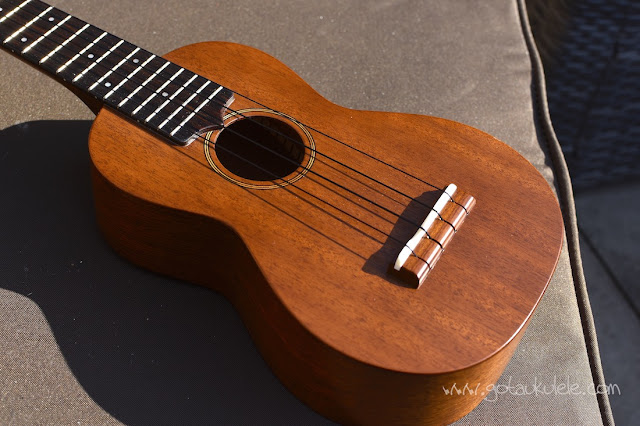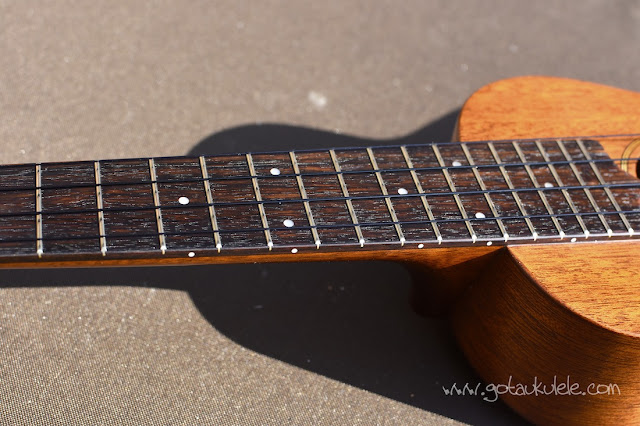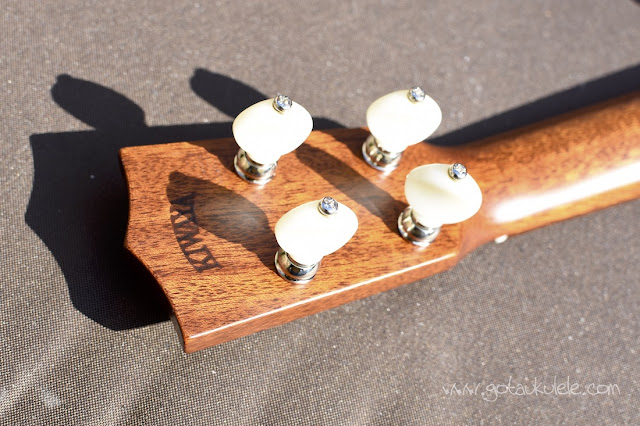I do like it when I get to review a second ukulele from a less common brand on Got A Ukulele. And I particularly like it when it follows a very highly scored instrument the first time around. Say hello to the Kiwaya KTS-5 Soprano.
That first Kiwaya ukulele I reviewed goes back a few years in the form of the KS-5, and as you may recall that one was scored very highly. In fact it remains to be the best laminate bodied ukulele I have ever played - seriously. Like that one, this too is made in Japan, and is the same line of instruments that are branded with the name 'Famous' for their domestic market. The addition of the letter T in the name of this one differentiates if from the KS-5 in that this one is made from all solid tonewoods.
In fact, it's made of all solid mahogany, and is very clearly modelled on a vintage Martin Soprano in virtually every way. We have a traditional double bout shape, standard scale with a single piece top and back and two piece sides. In fact it is very similar in all departments to my recently reviewed Martin S1 soprano.
Compared to the woods on the Martin S1 though, this just looks to be higher quality in virtually every respect. The grain is straighter up and down the body and the rubbed semi gloss finish just feels a little more 'complete' than it does on the Martin. Otherwise it's the same sort of construction, same wood type, same slightly arched back, same lack of edge binding, same sort of colour.
It also has the same sort of bridge, with a rosewood bridge mounting of the slotted style. It's more nicely finished though, the wood is paler and seems less rough than the Martin. Seated in this is a compensated bone saddle.
We have a transfer soundhole rosette under the gloss, but unlike the stark white ring on the S1, this one is gold and looks more aged and in keeping with the style of the instrument. The more I look back on that Martin rosette the more I don't like it at all. Oddly, I was critisised recently for mentioning such things as someone didn't think they were relevant and purely subjective. Of course they are subjective, but these ARE personal reviews! If such things that bother me don't bother you then that's fine!
Inside we have an impeccable build, with delicate bracing, notched kerfing and no mess at all. Absolutely zero complaints from me in here. Extremely tidy.
The neck is made from a single piece of mahogany and is very shallow and traditional in profile at the nut end. Incidentally that nut is 36mm wide, adding to playability for someone with big hands like me.
We have 17 nickel silver frets with 12 to the body joint. People often wrongly think that sopranos with more than 12 frets are 'long neck' sopranos, but that is a different thing altogether. The scale length on this nut to bridge is exactly the same as a standard soprano - it's just that the fingerboard extends further down over the top of the body to house the extra frets. Long neck sopranos have soprano sized bodies, but longer necks from the top of the body too and hence a longer scale length. The edges of the fingerboard on this are unbound but the fret edges are all dressed far better than on the Martin which was cutting it very fine towards having sharp ends. This one is smooth as silk. The fingerboard itself is a nice dark rosewood with some colour variation and is similarly shaped at the body end to that on the Martin. Where the fingerboard extends over the top it shows that it is extremely thin meaning you dont have a huge hunk of rosewood hanging over the top which I know worries some people about extended fingerboards. And for those that don't like sopranos with extended fingerboards like this, Kiwaya also make a KTS-4 model which is identical to this one, but with a more standard 12 frets in total that stop at the top of the body. For me, I want extra frets so this suits. We have fingerboard position markers at the 5th, 7th, 10th 12th and 15th with the markers at the 7th and 12th in attractive double dots. We also have side dots as you can see.
In comparison to the Martin S1 I much prefer the frets and fingerboard on this one, but I think the Martin has a nicer feel and grain to the actual neck wood on the back. It's more naturally finished and I prefer that to satin or gloss coated necks. Not that the neck on this one is in any way sticky, I just like the raw wood feel on the Martin more.
Beyond the bone nut we have a three pointed crown headstock with a really attractive chamfered top edge. The Kiwaya logo is screen printed in gold and looks a million times better than the Martin S1 for that reason. Yes I KNOW that I wrote about makers not having much imagination in headstock design, but I will let Kiwaya off with this one as they make no bones about this being a direct homage to Martin. If anything, it would look wrong without a crown headstock!
Flipping it over and we have another Kiwaya logo, this time embossed in the back with a pyrographic stamp / branding. I really love that and something else that harks back to original Martins. Tuning wise we have Gotoh Deluxe friction pegs with cream buttons and chrome metalwork. They really are superb and turn like butter. Certainly better than the regular Grovers on the Martin S1. A reminder for new readers on this topic - cheap friction pegs are usually terrible and wrongly give all other friction pegs a bad name. GOOD friction pegs are a joy, and these are good pegs. More about friction pegs here.
Completing the deal are the preferred strings of Kiwaya, in the form of Fremont Blackline fluorocarbons. There are very mixed opinions out there on these strings, and having played this one a while I think I may well be swapping them out. Don't get me wrong, they are very good strings, but I am struggling with them and explain that more below. That's just me though and strings are too personal to affect a ukulele review score, we all have our favourites... And for all of that you will be paying a not inconsiderable £560 or thereabouts in the UK. So that's a fair bit more than the Martin S1. Expensive? Yes, you could say so, there's simply no getting away from that.
But I think I have given enough hints in this review to suggest that for me it tops the Martin in virtually all areas. It's also just as light as the Martin, with a very thin resonant build, perfectly balanced and has great construction in all departments.
The body just feels nicer in the hands than the Martin too, on account of that finish - it's a similar satin, but just a nicer smoother overall finish on the touch. Small things, but this simply feels more nicely done. I put it down to it being another example of what the Japanese do so very well - impeccable fine craftsmanship.
It's also ultra resonant on account of that light weight and thin tone woods. It's an extremely lively little thing! And that really comes through in the sustain and volume power this one can project. It's got a real punch to it yet a much richer / less bright tone than the Martin. Now the strings may have something to do with that and as I say above, I am not totally taken with them. That said, my dislike of them is less to do with tone and more to do with the slightly lower tension and more slippery feel on the fingers that I don't care for. Like I always say though, I don't mark ukuleles up or down based on strings (unless they are absolutely dreadful!). What I find with the low tension of these is that I find it too easy to throw them out of tuning by fretting them. Of course, that says more about MY technique that the strings themselves, so don't read too much into this comment. Generally, tone wise though, this is still much less zingy and bright than the Martin, but I don't say that like it's a bad thing. It's a much more complex, richer and more rounded tone and one that I am very, VERY taken with. I suppose we could say that the Martin does the bright soprano bark very well, but the Kiwaya adds much more depth and character to it. It doesn't quite have the Martin 'jangle' to the tone, but it's certainly got a great voice all of its own.
Yes, the price is on the high side I suppose, but Kiwaya certainly seem to have no trouble selling them at this point and they are always in high demand so what does that tell you?
So there you have it. It sounds traditional, it looks traditional and is, all round, a superb ukulele. Yes it's more expensive than some instruments of a comparable style, not least the Martin S1, but like all good ukuleles, I can SEE exactly where that money has gone. It's impeccably made and sounds sublime. Quite simply one of the best ukuleles I have ever played.
Very highly recommended!
http://takumiukulele.com/kiwayaukuleles.html
STOP PRESS!
I did change the strings to Martin Fluorocarbon - As requested - two files below of the Kiwaya recorded side by side with the Martin S1 fo you to compare the sounds. Same strings, same chords
UKULELE PROS
Looks
Great build quality
Excellent finish
Nice headstock detailing
Great tuners
UKULELE CONS
None really, but I will personally be changing the strings.. just me.. and it hasn't affected the score.
Bit expensive
UKULELE SCORES
Looks - 9.5 out of 10
Fit and finish - 9.5 out of 10
Sound - 9.5 out of 10
Value for money - 8.5 out of 10
OVERALL UKULELE SCORE - 9.3 out of 10
UKULELE VIDEO REVIEW
© Barry Maz
WHY NOT DONATE TO HELP KEEP GOT A UKULELE GOING?

THANKS!










I've got the KTS4. I've found I like Living Water strings on it. I've used Worth Brown's on all my ukes, but the C string was too boomy ehen fingerpicking on the KTS4.
ReplyDeleteYes, I have now switched to Martin Fluorocarbon - very similar to Living Water
ReplyDeleteIt would be interesting to compare this to the s1 with the same strings on both. Don't you want to add a video where you are playing both?
DeleteGreetings from Frankfurt,
Gwendolyn
Great review Baz. I bought one of these a couple of months ago and tried various strings ending up with the new Aquila Carbon Blacks which seem to really bring out the best in this fabulous soprano. But, as you say, it's so personal.
ReplyDeleteGwendolyn - can probably sort a recording, maybe not a video - leave it with me
ReplyDeleteGreat! I'm looking forward to it.
ReplyDeleteGwendolyn - sound comparisons now in the article above - in the Stop Press section at the end.
ReplyDeleteThank you very much. I listened to it over and over and cannot really decide which one I prefer. I like them both very much. My four year old son clearly prefers the Kiwaya :-) the more I listen to it, the more I agree with him...
ReplyDeleteAwesome that you could put up a comparison with the Martin. For me, the Kiwaya sound appeals more. A bit fuller sounding? I could easily see picking this one over the Martin if I was shopping in that price range. I see you have an Ohana SK-35 in your queue. I'm curious how that will compare? Especially at a lower price point.
ReplyDeleteMaybe it's the lighting in your photographs, but the fingerboard (fretboard) looks glossy. As though it has a clear gloss over it.
ReplyDeleteDoes it? Or is it oiled or is it juat a trick of the light?
No gloss - just good quality wood
Delete